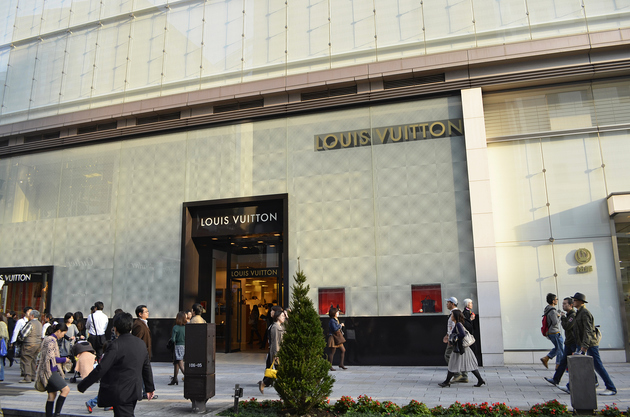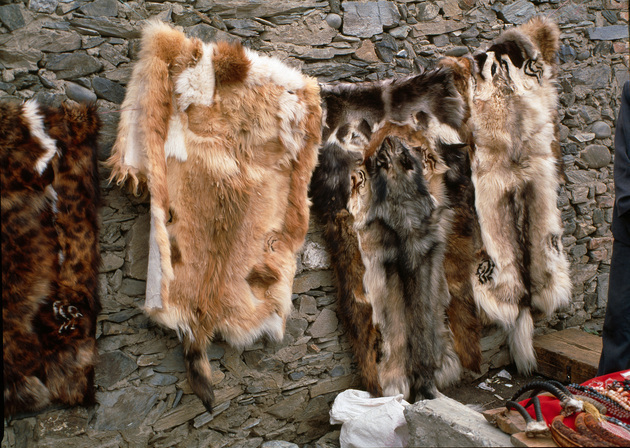
Photo/VCG
Feb. 22 (NBD) -- "I'd rather go naked than wear fur!" "Fur is dead!" "Blood on your hands!"
During some major international fashion weeks each year, animal protection groups gather outside the shows and make the above statements, protesting against the use of fur in collections of luxury brands. Improved global awareness of environmental protection and animal rights pressure fashion houses to make a difference.
LVMH, parent company of Louis Vuitton, announced Monday it would implement new crocodile farming standards to ensure "responsible" supply of crocodilian leather.
The French fashion house said in the statement that it would follow the new criteria "developed and validated by a committee of technical experts" based on preservation of the species and respect for the local communities, animal welfare all along the life stages of the animals, working conditions of men and women on the farms as well as environment protection.
The world's largest animal rights organization PETA (People for the Ethical Treatment of Animals) in 2016 released footages depicting the horrific way in which the crocodiles are raised and killed in farms which supply crocodile skins to LVMH.
The exposed videos showed that workers in the crocodile farms in Vietnam electroshocked the animals and then attempted to kill them by cutting into their necks and ramming metal rods down their spines, and skinned the crocodiles while the animals are still bleeding and moving.
The footages of the horrifying reality facing tens of thousands of crocodiles revealed the cruelty and chaos behind the "luxury" leather bag business and aroused public awareness of animal rights. LVMH has denied any relationship with the farms exposed by PETA.
Jean Baptiste Voisin, strategy director for LVMH, stressed in the statement that the company decided to set a new frame of reference by launching a new standard for the industry, whose regulations seemed "insufficient" to the giant French retailer. Three farms which supply an LVMH tannery in Singapore have already been certified as meeting the new standards.
In an interview with NBD, PETA Asia, an affiliate of PETA, said that LVMH's new standards wouldn't prevent thousands of crocodiles from being held for life in narrow concrete enclosures or from being cruelly killed and skinned.

Photo/VCG
For a long time, animal furs and skins, as natural materials, have been loved by consumers for its warm and advanced texture. This, coupled with the rise of new consumer power and promotion of brand culture in the era of Internet marketing, has made crocodile bags, mink coats and snake skin belts symbols of a person's social identity and status.
In response to the surge in demands, fashion houses bought in succession fur farms to ensure leather sources. Tens of thousands of crocodiles, boa constrictors, lizards and other exotic animals are killed and their skins harvested.
In recent years, animal defense groups have intensified protests against animal abuse by luxury fashion houses. PETA purchased shares in Prada, LVMH and Hermès, trying to gain access to the fashion retailers' shareholder meetings and make the group's case for ending using exotic skins in the products.
Tang Xiaotang, founder of fashion consultancy firm No Agency, noted to NBD that going fur-free is a trend, as consumers with higher environmental consciousness and moral standards will require the brands they buy products from to raise corresponding standards and enterprises are obliged to fulfill their social responsibilities.
Britain in 2000 became the world's first country to ban fur farming and later Luxembourg, Norway and more countries took the same action.
Under the circumstances, a number of luxury brands such as Chanel, Gucci, Giorgio Armani and Versace have said "no" to animal furs.
"Fashion brands and designers have concluded that there's no way to turn an exotic animal into a fashion accessory without causing immeasurable suffering and have dropped exotic skins from their collections, and PETA urges LVMH to do the same," PETA Asia said.
Email: gaohan@nbd.com.cn


 川公网安备 51019002001991号
川公网安备 51019002001991号





